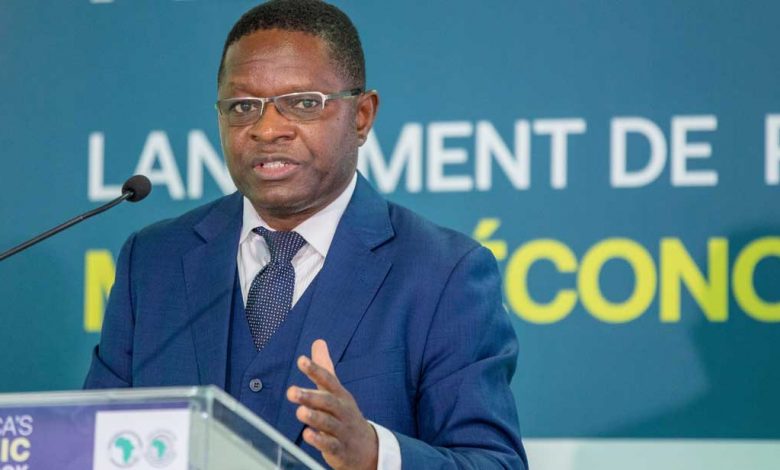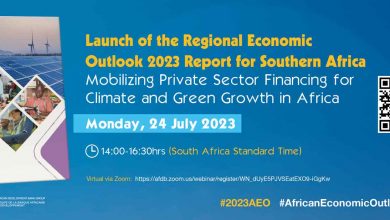Regular analysis of economic performance could support investment decisions in Africa, says African Development Bank | chief economist African Development Bank

Diplomat.Today
The African Development Bank
2023-01-23 00:00:00
——————————————-
Acting Chief Economist and Vice President for Economic Governance and Knowledge Management of the African Development Bank Group, Professor Kevin Chika Uramashares his thoughts on the inauguration Africa’s macroeconomic performance and outlook report, released on Thursday, January 19.
The new biennial publication aims to provide African policymakers, global investors, researchers and other development partners with an astute, timely, evidence-based assessment of the continent’s recent macroeconomic performance and near- to medium-term outlook amid dynamic global economic developments.
Why is Africa’s macroeconomic performance and outlook big delay?
Like other regions of the world, Africa continues to face overlapping shocks such as the COVID-19 pandemic, the impacts of climate change, rising geopolitical tensions, supply chain disruptions and the tightening of global financial conditions impacting key macroeconomic indicators.
The macroeconomic indicators include economic growth, financial sector development, interest rates and exchange rates, fiscal positions, current account positions, financial flows and debt dynamics that make policy making and investment decisions very challenging.
The Africa Macroeconomic Performance and Outlook Report covers all African countries and aims to provide a regular analysis of the recent evolution and short to medium term outlook of these key macroeconomic indicators at continental, regional and country level. It also proposes policies to support policy making and investment decisions on the continent.
The report will be published twice a year – in the first and third quarters – to provide policymakers, investors and all stakeholders with real-time and evidence-based information on the factors shaping Africa’s development.
Why did the bank consider it necessary to prepare the report? What were the main objectives?
Africa’s Macroeconomic Performance and Outlook Report addresses a critical need for timely information to aid decision-making in a context of heightened global and regional uncertainties.
Global macroeconomic conditions have recently become uncertain, with ongoing multiple shocks challenging policymaking and investment decisions. With these global shocks and their interaction with the prevailing areas of domestic and regional risk, the need for regular diagnosis and targeted policy action to address their impact on African economies is critical.
With the release of Africa’s Macroeconomic Performance and Outlook Report, The Bank — Africa’s premier knowledge broker — reaffirms to African policymakers that it has a mandate to shape the African narrative on key issues relevant to the continent’s development .
The report therefore serves as a compass for African countries regarding their economic situation, providing interested parties and stakeholders with an up-to-date, evidence-based assessment of the continent’s recent macroeconomic performance and short- to medium-term prospects. period amid dynamic global economic developments.
What distinguishes this report from the African Economic Outlook, which is released annually by the African Development Bank Group?
The new reports complement the African Economic Outlook (AEO) report, the Bank’s flagship report, which focuses on key emerging issues relevant to Africa’s development.
The MEO aims to provide an up-to-date, evidence-based assessment of Africa’s short to medium-term macroeconomic performance and outlook, while the AEO is both broadly based and discusses Africa’s macro and microeconomic performance and outlook, and theme-oriented, focusing the analyzes each year on a different key emerging issue relevant to Africa’s development, in line with the High 5s of the Bank of Light up and Power Africa; FeedAfrica; industrialize Africa; integrate Africa; and improve the quality of life of the people of Africa.
How will African countries fare in 2022? What are the economic projections for Africa for 2023-2024?
Despite increasingly uncertain and challenging global macroeconomic conditions, Africa’s economic performance has proved resilient. Of the 54 countries, 53 maintained positive growth in 2022, giving the continent a stable growth rate of 3.8 percent over that period.
Africa’s stable economic performance is expected to continue over the medium term, with projected growth of 4% in 2023 and 2024, above projected global averages of 2.7% and 3.2% respectively.
The projected stable outlook for 2023-2024 reflects continued policy support in Africa, global efforts to mitigate the impact of external shocks and rising uncertainty in the global economy, expected growth in demand for African raw materials and green minerals as countries look for alternative food resources and energy to counter the effects of the Russian invasion of Ukraine, and green minerals to support global green transitions.
Rising food and energy prices following Russia’s invasion of Ukraine, and the impact of droughts and floods in some countries, have fueled inflationary pressures, pushing average inflation in Africa by 0.9 percentage points to 13.8% in 2022, the highest rate in more than a decade. However, inflation is expected to fall to 13.5% in 2023 and reach a single-digit level of 8.8% in 2024.
Tightening global financial conditions in 2022 have destabilized foreign exchange markets in many African countries, causing domestic currencies to fall and government borrowing costs to rise, which could exacerbate debt vulnerability in 2023 and 2024.
Based on the report’s findings, what is your medium-term forecast for the African economy? What are the risks to watch out for?
The welcome recovery and economic resilience of African countries in the short to medium term is accompanied by cautious optimism given significant global uncertainties and risks.
Risks of default could increase in some African countries given the already high accumulation and changed structure of public debt over the past decade, the additional financial pressures created by the appreciating US dollar and global tightening monetary conditions.
Climate change can increase losses and damage from extreme weather events and increase fiscal risks for countries. The heavy dependence on the export of primary raw materials with limited added value exposes countries to commodity price volatility and may delay the structural transformation of the green transition.
With the low vaccine coverage of COVID-19 across Africa, currently at 26%, there is a moderate risk of new variants emerging, which could be amplified by a full reopening of the global economy.
We also have regional conflicts in key hotspots such as Burkina Faso, the Democratic Republic of the Congo, Ethiopia, Mali and Mozambique, which could put further pressure on countries’ fiscal positions through increased security spending and reversed investment flows.
In addition, political risks could increase in 30 African countries. Algeria, the Democratic Republic of the Congo, Egypt, Ethiopia, Libya, Madagascar, Nigeria, South Africa and Zimbabwe will hold national elections in 2023 or 2024.
Finally, there is a low to moderate risk of continued geopolitical tensions and an escalation of the Russian invasion of Ukraine, which could further disrupt global supply chains and commodity markets.
What measures should countries take to limit these risks?
There are several measures that African countries can take in the short to medium and long term to address existing and emerging threats to inclusive and sustainable development.
They include timely and aggressive monetary tightening – especially in countries with acute inflation – and cautious tightening in countries where inflationary pressures are low.
Effective coordination of fiscal and monetary measures to maximize the results of targeted policy intervention is required to dampen inflation and fiscal pressures and boost intra-African trade, particularly in manufactured products, to shield economies from volatile commodity prices.
Another important measure is accelerating structural reforms to build tax administration capacity and invest in digitization and e-governance. This would increase transparency, reduce illicit financial flows and increase domestic resource mobilization.
Africa also needs to embrace institutional governance and implement policies that attract private finance – especially in climate-resilient and pandemic-resistant greenfield projects – and mobilize Africa’s resources for inclusive and sustainable development.
Equally important is the pursuit of structural budget deficit reduction and public debt accumulation in countries that are at high risk of indebtedness or already in debt distress.
Managing foreign exchange reserves to reduce exchange rate volatility and improve export competitiveness can be part of effective risk mitigation tools.
Countries should also implement local content development and franchising policies to develop value chains and extract more value from natural resources, especially in countries with minerals for green development.
African countries need to boost regional trade to increase resilience to spillovers from the global economic slowdown and reduce persistent trade deficits. Implementing structural reforms to boost regional trade can create a more vibrant regional market in the medium to long term.
What do you think are the main conclusions of the report?
The report provides fundamental insights that African policymakers, global investors, researchers and other development partners will find useful and use as an essential reference tool. It gives hope for continued economic resilience amid the heightened risk of a global recession. Importantly, economic growth has been positive in all five African regions and 53 of the 54 African countries have a stable medium-term outlook in 2022 despite multiple shocks.
But the recovery and economic resilience of African countries in the short to medium term is accompanied by cautious optimism given the high level of global uncertainty. Therefore, the bold policy measures outlined above should be implemented to address the effects of rising inflation and support growth on the higher trajectory needed to reduce poverty. To address the significant funding gap in Africa, it is imperative to establish policies that can mobilize and leverage private finance for development in Africa.
——————————————-



